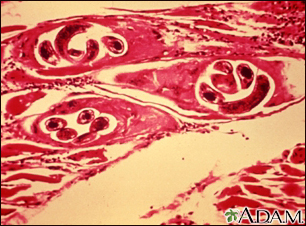Trichinosis
Definition
Trichinosis is an infection with the roundworm Trichinella spiralis.
Alternative Names
Parasite infection - trichinosis; Trichiniasis; Trichinellosis; Roundworm - trichinosis
Causes
Trichinosis is a parasitic disease caused by eating meat that has not been thoroughly cooked and contains cysts (larvae, or immature worms) of Trichinella spiralis. This parasite can be found in pig, bear, walrus, fox, rat, horse, and lion.
Wild animals, especially carnivores (meat eaters) or omnivores (animals that eat both meat and plants), should be considered possible sources of roundworm disease. Domestic meat animals raised specifically for eating under US Department of Agriculture (government) guidelines and inspection can be considered safe. For this reason, trichinosis is rare in the United States, but it is a common infection worldwide.
When a person eats meat from an infected animal, trichinella cysts break open in the intestine and grow into adult roundworms. The roundworms produce other worms that move through the gut wall and into the bloodstream. The worms invade muscle tissues, including the heart and diaphragm (the breathing muscle under the lungs). They can also infect the lungs and brain. The cysts remain alive for years.
Symptoms
Symptoms of trichinosis include:
- Abdominal discomfort, cramping
- Diarrhea
- Facial swelling around the eyes
- Fever
- Muscle pain (especially muscle pain with breathing, chewing, or using large muscles)
- Muscle weakness
Exams and Tests
Tests to diagnose this condition include:
- Blood tests such as complete blood count (CBC), eosinophil count (a type of white blood cell), antibody test, and creatine kinase level (an enzyme found in muscle cells)
- Muscle biopsy to check for worms in the muscle
Treatment
Medicines, such as albendazole, can be used to treat infections in the intestines. A mild infection does not usually need treatment. Pain medicine can help relieve muscle soreness after the larvae have invaded the muscles.
Outlook (Prognosis)
Most people with trichinosis have no symptoms and the infection goes away by itself. More severe infections may be difficult to treat, especially if the lungs, heart, or brain is involved.
Possible Complications
Possible complications include:
- Encephalitis (brain infection and inflammation)
- Heart failure
- Heart rhythm problems from heart inflammation
- Pneumonia
When to Contact a Medical Professional
Call your health care provider if you have symptoms of trichinosis and you recently ate undercooked or raw meat that might have been contaminated.
Prevention
Pork and meat from wild animals should be cooked until well done (no traces of pink). Freezing pork at a low temperature (5°F or -15°C or colder) for 3 to 4 weeks will kill the worms. Freezing wild game meat does not always kill the worms. Smoking, salting, and drying meat are also not reliable methods of killing the worms.
Gallery


References
Bogitsh BJ, Carter CE, Oeltmann TN. Intestinal nematodes. In: Bogitsh BJ, Carter CE, Oeltmann TN, eds. Human Parasitology. 5th ed. Waltham, MA: Elsevier Academic Press; 2019:chap 16.
Diemert DJ. Nematode infections. In: Goldman L, Schafer AI, eds. Goldman-Cecil Medicine. 26th ed. Philadelphia, PA: Elsevier; 2020:chap 335.
Kazura JW. Tissue nematodes including trichinellosis, dracunculiasis, filariasis, loiasis, and onchocerciasis. In: Bennett JE, Dolin R, Blaser MJ, eds. Mandell, Douglas, and Bennett's Principles and Practice of Infectious Diseases. 9th ed. Philadelphia, PA: Elsevier; 2020:chap 287.